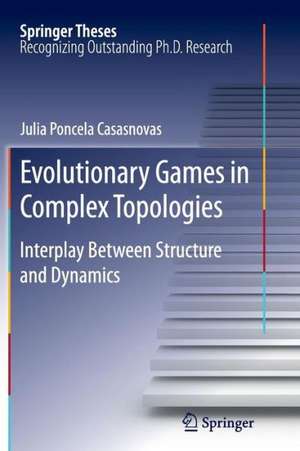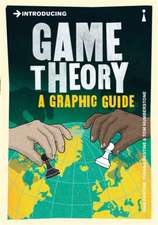Evolutionary Games in Complex Topologies: Interplay Between Structure and Dynamics: Springer Theses
Autor Julia Poncela Casasnovasen Limba Engleză Paperback – 11 iun 2014
The thesis explores the interface between the underlying structure of a given population and the outcome of the cooperative dynamics taking place on top of it, (namely, the Prisoner's Dilemma Game). The first part of this work analyzes the case of a static system, where the pattern of connections is fixed, so it does not evolve over time. The second part develops two models for growing topologies, where the growth and the dynamics are entangled.
| Toate formatele și edițiile | Preț | Express |
|---|---|---|
| Paperback (1) | 634.32 lei 6-8 săpt. | |
| Springer Berlin, Heidelberg – 11 iun 2014 | 634.32 lei 6-8 săpt. | |
| Hardback (1) | 639.25 lei 6-8 săpt. | |
| Springer Berlin, Heidelberg – 18 mai 2012 | 639.25 lei 6-8 săpt. |
Din seria Springer Theses
- 18%
 Preț: 997.88 lei
Preț: 997.88 lei -
 Preț: 389.88 lei
Preț: 389.88 lei - 15%
 Preț: 646.94 lei
Preț: 646.94 lei - 18%
 Preț: 943.43 lei
Preț: 943.43 lei -
 Preț: 399.29 lei
Preț: 399.29 lei - 18%
 Preț: 944.99 lei
Preț: 944.99 lei - 15%
 Preț: 636.80 lei
Preț: 636.80 lei - 18%
 Preț: 941.05 lei
Preț: 941.05 lei - 15%
 Preț: 643.16 lei
Preț: 643.16 lei - 15%
 Preț: 642.68 lei
Preț: 642.68 lei - 18%
 Preț: 1103.62 lei
Preț: 1103.62 lei - 20%
 Preț: 558.82 lei
Preț: 558.82 lei - 18%
 Preț: 1112.30 lei
Preț: 1112.30 lei - 18%
 Preț: 944.19 lei
Preț: 944.19 lei - 18%
 Preț: 1109.92 lei
Preț: 1109.92 lei - 18%
 Preț: 1217.27 lei
Preț: 1217.27 lei - 15%
 Preț: 640.06 lei
Preț: 640.06 lei - 15%
 Preț: 636.45 lei
Preț: 636.45 lei - 15%
 Preț: 640.06 lei
Preț: 640.06 lei - 15%
 Preț: 640.88 lei
Preț: 640.88 lei -
 Preț: 389.70 lei
Preț: 389.70 lei - 20%
 Preț: 563.89 lei
Preț: 563.89 lei -
 Preț: 393.35 lei
Preț: 393.35 lei - 15%
 Preț: 637.93 lei
Preț: 637.93 lei - 15%
 Preț: 641.85 lei
Preț: 641.85 lei - 18%
 Preț: 1225.94 lei
Preț: 1225.94 lei - 20%
 Preț: 551.36 lei
Preț: 551.36 lei - 18%
 Preț: 1229.10 lei
Preț: 1229.10 lei - 15%
 Preț: 639.25 lei
Preț: 639.25 lei - 18%
 Preț: 999.45 lei
Preț: 999.45 lei - 15%
 Preț: 640.06 lei
Preț: 640.06 lei - 18%
 Preț: 1220.45 lei
Preț: 1220.45 lei - 18%
 Preț: 1116.26 lei
Preț: 1116.26 lei - 18%
 Preț: 1110.72 lei
Preț: 1110.72 lei - 18%
 Preț: 1000.87 lei
Preț: 1000.87 lei - 18%
 Preț: 891.17 lei
Preț: 891.17 lei - 15%
 Preț: 640.06 lei
Preț: 640.06 lei - 5%
 Preț: 1154.07 lei
Preț: 1154.07 lei - 15%
 Preț: 635.96 lei
Preț: 635.96 lei - 15%
 Preț: 640.88 lei
Preț: 640.88 lei -
 Preț: 387.20 lei
Preț: 387.20 lei - 18%
 Preț: 1109.92 lei
Preț: 1109.92 lei -
 Preț: 385.25 lei
Preț: 385.25 lei -
 Preț: 385.25 lei
Preț: 385.25 lei - 18%
 Preț: 1112.30 lei
Preț: 1112.30 lei - 18%
 Preț: 999.45 lei
Preț: 999.45 lei -
 Preț: 386.99 lei
Preț: 386.99 lei - 15%
 Preț: 637.13 lei
Preț: 637.13 lei - 20%
 Preț: 554.20 lei
Preț: 554.20 lei - 20%
 Preț: 555.57 lei
Preț: 555.57 lei
Preț: 634.32 lei
Preț vechi: 746.26 lei
-15% Nou
Puncte Express: 951
Preț estimativ în valută:
121.38€ • 127.05$ • 101.02£
121.38€ • 127.05$ • 101.02£
Carte tipărită la comandă
Livrare economică 31 martie-14 aprilie
Preluare comenzi: 021 569.72.76
Specificații
ISBN-13: 9783642434358
ISBN-10: 3642434355
Pagini: 172
Ilustrații: XIV, 158 p.
Dimensiuni: 155 x 235 x 9 mm
Greutate: 0.25 kg
Ediția:2012
Editura: Springer Berlin, Heidelberg
Colecția Springer
Seria Springer Theses
Locul publicării:Berlin, Heidelberg, Germany
ISBN-10: 3642434355
Pagini: 172
Ilustrații: XIV, 158 p.
Dimensiuni: 155 x 235 x 9 mm
Greutate: 0.25 kg
Ediția:2012
Editura: Springer Berlin, Heidelberg
Colecția Springer
Seria Springer Theses
Locul publicării:Berlin, Heidelberg, Germany
Public țintă
ResearchCuprins
Some Basic Concepts on Complex Networks and Games.- The Prisoner’s Dilemma Game on Static Complex Networks.- Other Games on Static Complex Networks.- The Prisoner’s Dilemma Game on Random Scale-Free Networks.- The Prisoner’s Dilemma Game on Scale-Free Networks with Limited Number of Interactions.- Complex Networks from Evolutionary Preferential Attachment.- Complex Networks from Other Dynamic-Dependent Attachment Rules.
Textul de pe ultima copertă
There are many examples of cooperation in Nature: cells cooperate to form tissues, organs cooperate to form living organisms, and individuals cooperate to raise their offspring or to hunt. However, why cooperation emerges and survives in hostile environments, when defecting would be a much more profitable short-term strategy, is a question that still remains open. During the past few years, several explanations have been proposed, including kin and group selection, punishment and reputation mechanisms, or network reciprocity. This last one will be the center of the present study.
The thesis explores the interface between the underlying structure of a given population and the outcome of the cooperative dynamics taking place on top of it, (namely, the Prisoner's Dilemma Game). The first part of this work analyzes the case of a static system, where the pattern of connections is fixed, so it does not evolve over time. The second part develops two models for growing topologies, where the growth and the dynamics are entangled.
The thesis explores the interface between the underlying structure of a given population and the outcome of the cooperative dynamics taking place on top of it, (namely, the Prisoner's Dilemma Game). The first part of this work analyzes the case of a static system, where the pattern of connections is fixed, so it does not evolve over time. The second part develops two models for growing topologies, where the growth and the dynamics are entangled.
Caracteristici
Gives important insights into the emergence and evolution of cooperation Interdisciplinary topic of interest to physicists, mathematicians and life scientists Nominated as an outstanding contribution by the University of Zaragoza Includes supplementary material: sn.pub/extras
















